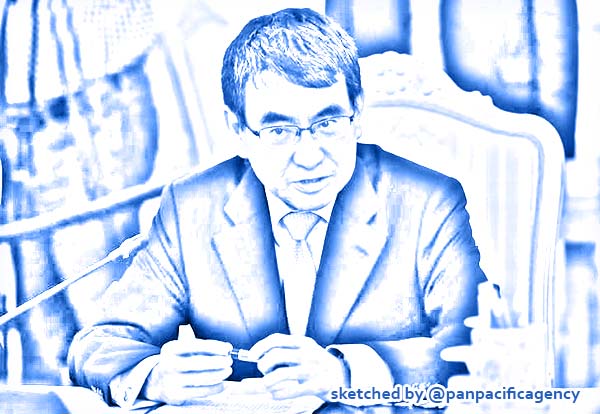No progress made over pact in Japan-S Korea defense chief talks

Taro Kono. Photo: REUTERS. Sketched by the Pan Pacific Agency.
BANGKOK, Nov 17, 2019, Kyodo. Japan and South Korea made little progress over a bilateral military intelligence-sharing pact set to expire this month in their defense ministerial talks in Bangkok on Sunday, Japan Today reported.
In the first meeting between the two Asian neighbors’ defense chiefs since October last year, Japanese Defense Minister Taro Kono urged his South Korean counterpart Jeong Kyeong Doo to reverse Seoul’s decision to allow the General Security of Military Information Agreement, also known as GSOMIA, to expire on Saturday.
“We want to call on (South Korea) to act sensibly,” Kono said at the start of the meeting, which was open to the media.
Jeong told reporters after the meeting that he called for a “diplomatic solution,” saying that the decision not to renew the accord resulted from Japan’s tightening of export controls on some South Korea-bound products for national security reasons.
Reached in 2016, the accord is mainly aimed at countering the North Korean nuclear and missile threat.
The two sides nevertheless agreed that they should maintain defense communication to deal with North Korea-related issues.
Japan has repeatedly asked South Korea to renew the accord, as Tokyo is also concerned about a possible weakening of trilateral security cooperation with the United States.
But Seoul insists it will only reconsider its August decision to scrap the agreement if Tokyo first reverses its move earlier this year to tighten controls on exports of some materials needed by South Korean manufacturers of semiconductors and display panels.
A three-way meeting among Kono, Jeong and U.S. Defense Secretary Mark Esper is also set to take place on Sunday in Bangkok on the sidelines of the annual ASEAN Defense Ministers’ Meeting-Plus, according to Japanese officials.
Esper visited South Korea before traveling to the Thai capital in an attempt to persuade Seoul to renew the intelligence-sharing pact.
But South Korean President Moon Jae In told Esper on Friday that it is “difficult” for Seoul to share military intelligence with Japan, while promising to make continued efforts toward security cooperation among the three countries.
Japan-South Korea ties, which have long been haunted by wartime history, sunk to their lowest level in years in October last year when South Korea’s top court ordered a Japanese steelmaker to pay compensation for forced labor during Japan’s 1910-1945 colonial rule of the Korean Peninsula.
Meanwhile, the relationship between Japanese and South Korean defense authorities severely deteriorated last December when the South Korean navy allegedly locked its fire-control radar on a Japanese Self-Defense Forces patrol plane.
Before returning to Japan on Tuesday, Kono plans to also meet bilaterally with Esper and defense ministers from other countries.
The ADMM-Plus meeting involves the defense chiefs from the 10-member Association of Southeast Asian Nations and its eight regional partners — Australia, China, India, Japan, New Zealand, South Korea, Russia and the United States.